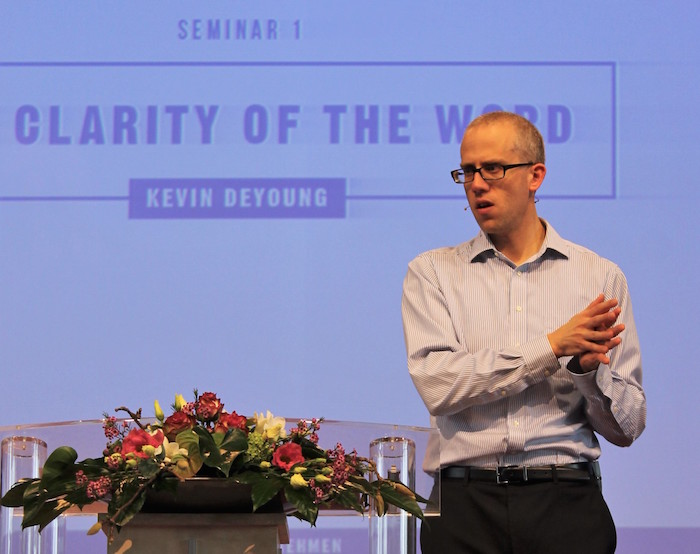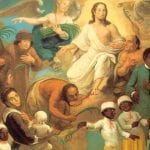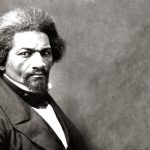Last year I reported on a conference hosted by Evangelium 21, a ministry seeking to promote church renewal in German-speaking Europe. This year they invited Kevin DeYoung (Presbyterian pastor in Michigan), William Taylor (Anglican pastor in London), and Stephen Nichols (church historian and president of Reformation Bible College) to join them in addressing the topic of Scripture’s authority, clarity, and sufficiency. The conference was largely based around DeYoung’s recent book Taking God at His Word [20 quotes | interview | review], translated into German under the title Gott Beim Wort Nehmen. Occurring on the eve of the Reformation’s 500th anniversary, the event drew 700 brothers and sisters from around the world to join hearts and minds in thinking and praying about a topic that concerns our common evangelical identity and mission.
I talked with DeYoung, Nichols, and Matthias Lohmann (founder and chairman of Evangelium 21) on challenges to the authority of Scripture past and present, and how believers today can learn from our Protestant forebears.
 Matthias, why did you decide to address the authority of Scripture for this year’s conference? Why not put this energy into something less divisive like social justice or community renewal?
Matthias, why did you decide to address the authority of Scripture for this year’s conference? Why not put this energy into something less divisive like social justice or community renewal?
Lohmann: The Christian faith is all about Christ, and the only way we can know him is through the Bible. How can we talk in a meaningful way about any Christian topic without knowing the source of it? And since the Bible so under attack, in Germany more so than in the United States, I think it’s crucial to address the topic. Today, just as 500 years ago when Luther called the church back to sola scriptura, we have an urgent need to listen to God’s Word and to learn anew to trust it, both in its content and in its power.
Kevin, what would you say are the biggest challenges to the authority of Scripture that churches face today?
DeYoung: I think it depends on the type of church. Certainly the authority and the inerrancy of Scripture tend to be the liberal challenges. And then maybe the postmodern problem is the clarity of Scripture: Has God really spoken to us in a way that’s clear, or are we left just with a thousand different interpretations? But I think particularly for evangelicals otherwise squared away on the doctrine of Scripture, it’s the sufficiency of Scripture they really question: Do I need something more than the Bible? Do I need a special voice? Is the Bible really enough? Can I really trust it for my ministry? In every generation these issues return. The Reformers dealt with them, but they often take on a new guise and new garb and need to be addressed constantly.
You brought up the Reformers, and of course we’re here in the land of Luther. He confronted many challenges to biblical authority, but it’s a different world today: post-Christian, relativistic, pluralistic, disenchanted—adjectives that didn’t exist then. As we commemorate the 500th anniversary of the Reformation, should we still look to the Reformers as examples to promote the authority of Scripture in our age?
Lohmann: Luther wasn’t just interested in addressing topics of his time but, more importantly, topics that were timeless. He wouldn’t be happy if our celebration focused on what he did in 1517. But he’d be delighted if we celebrate what God has done throughout history, and in particular through Jesus when he came to live among and redeem us, as passed down through the Spirit-inspired words of the apostles. That’s what Luther was all about. He said just listen to the Word of God. And that’s what he did primarily, and then he passed along what he’d received. There’s this famous quote about how he taught and preached the Word of God. Then in the meantime he slept and drank Wittenberg beer, and ultimately the Word did it all! Luther was about preaching timeless truth from God’s Word, and that’s what we must be about as well.
DeYoung: I agree. And I think very practically, there are two things they did so well in the Reformation that we need to do: preaching and publishing. Why are we even still talking about the Reformation? It was a great work of God, but the reason we can talk about it is because they left behind sermons, writings, and tracts that changed churches, hearts, and lives. There are more things written by Luther and Calvin than most of us read in a lifetime. I think it’s the same in our day. How do we address challenges to biblical authority? There’s no single, final conference that settles “the Bible issue” once and for all. We must produce a steady stream of teaching and put in writing what’s true. And even more so, it’s about faithful preaching. To paraphrase the Spurgeon line: you can defend the lion, or you can let the lion out of the cage. Only then will people be convinced the lion is really a lion.
Nichols: There was a darkness in Luther’s age. God used the Reformers as human instruments to bring light into the darkness of their day. And here we are, 500 years later. We are Luther’s heirs. We have a darkness in our age. It has a different garb and a different name, and there are different challenges. But we have the same gospel light and the same Word of God, and we must lift them high as they did. The other thing I love about the Reformers is they also wrote hymns. Good biblical theology causes us to sing, and we are seeing rich church music in our day. And then missions: Calvin sent missionaries to Brazil in the 1550s, and Luther sent missionaries all over Europe. The Reformation was a time in the church’s life when all the pistons were firing. So our prayer is “God, you did it 500 years ago. Do it again.”
Stephen, you came to Germany to talk about J. Gresham Machen. What does he have to do with Germany, and what can we learn from him today?
Nichols: Machen came to Germany for doctoral studies. Like Rudolph Bultmann and Karl Barth, he was a student under Wilhelm Herrmann in Marburg. So Machen was well aware of theological liberalism, experiencing it firsthand both in Germany and America. Bultmann and Barth also were responding to liberalism, but Machen took a different route and devoted himself to defending Scripture’s verbal plenary inspiration as well as its inerrancy. He stood firm on the Word of God. But he also understood the challenges and where they were coming from. And he didn’t duck; he responded. Liberalism challenged the virgin birth. So Machen wrote a scholarly book defending it. Liberalism said Jesus was about ethics, while Paul was about doctrine and “institutionalizing” Christainity. So Machen wrote a book on that, too. One of his biographers dubbed him “valiant for truth,” and even though there’s a new darkness with new challenges today, we need to likewise be valiant for truth and stand on God’s Word.
Editors’ note: Join us for our 2017 National Conference, “No Other Gospel: Reformation 500 and Beyond,” April 3 to 5 in Indianapolis. Browse the list of 65 speakers and 50 talks, and register soon.
Is there enough evidence for us to believe the Gospels?
 In an age of faith deconstruction and skepticism about the Bible’s authority, it’s common to hear claims that the Gospels are unreliable propaganda. And if the Gospels are shown to be historically unreliable, the whole foundation of Christianity begins to crumble.
In an age of faith deconstruction and skepticism about the Bible’s authority, it’s common to hear claims that the Gospels are unreliable propaganda. And if the Gospels are shown to be historically unreliable, the whole foundation of Christianity begins to crumble.



































